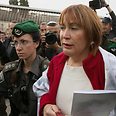


Sharansky: Kotel equality in 10 months
For first time, police say won't stop Women of Wall from praying with prayer shawls, phylacteries this Friday. Jewish Agency chairman submits request for building permits around Western Wall plaza ahead of implementation of his program for mixed public praying at site
The police have clarified, however, that they would not allow Torah scrolls into the women's section.
The Knesset's Committee on the Status of Women convened Tuesday for a special discussion initiated by Committee Chairwoman Aliza Lavi (Yesh Atid), in the presence of Jewish Agency Chairman Natan Sharansky, who presented his outline for solving the situation at the Western Wall.
Sharansky: Move materializing
The Jewish Agency chairman, who came up with the outline for equality at the Western Wall, said he had submitted a request for building permits around the site as part of the efforts to implement the plan. He said a dialogue was being held with the archeologists, some of whom are against works in the area for religious reasons.
Another obstacle Sharansky pointed to was the Muslim Waqf's objection, which has not been voiced so far but could be aroused by certain elements. He said he believed the government would fund the project on its own, but that the world Jewry would chip in if needed.
Sharansky declared, however, that the creation of an equal plaza could begin within a month and that the first stage could be completed within 10 months. He referred to the move as highly significant, saying it would provide a response to most of the existing problems. He added that the mentioned obstacles would not delay its implementation, but only the final stage whose implementation would take another two years.
At this stage, he told Ynet, the only thing delaying the start of the work was the need to wait for the building permits, which he said were expected to be received within a relatively short period of time.
The Jewish Agency chairman added that the Western Wall was a unique site, raising national and religious interest worldwide, and that every Jew in Israel and abroad had a special connection to the place.
"There's a natural interest for every Jew in the world to be able to come and express solidarity with his people and religion," he said. "The solution will not be in court or in Knesset legislation, but in a very wide agreement between all parts of the Jewish people. We must find a solution for everyone.
Sharansky noted that the parties were still at odds over the balance between the current Western Wall plaza's national and religious character (for example, in holding state ceremonies), and that he supported the Reform demand to add representatives to the foundation running the site.
"What will happen this Friday can contribute to the move and can destroy the move," he said. "I appeal to both side. The government has made an unprecedented decision in regards to the Women of the Wall's prayer, allowing them to pray their way. But even if they cannot do it with Torah scrolls, it's very important to keep calm."
Police: Torah scroll banned
The police representative clarified during the discussion that the police would not act against the District Court ruling on Friday. "We will not prevent the Women of the Wall from praying their way – at least in terms of a prayer shawl, phylacteries, Kaddish and Kedushah," he said.
He clarified, however, that they won't be allowed to bring in a Torah scroll due to a regulation of a Western Wall rabbi which bans the entry of an external Torah scroll.
Western Wall Rabbi Shmuel Rabinowitz said during the discussion that no one, including himself, was satisfied with the suggested solution, and that perhaps that was proof that the Sharansky outline was the right one.
The rabbi added that he was uncertain that the outline could be fully implemented, but that it was necessary to reach a wide agreement and recognition by all sides of the Western Wall as a uniting place – out of national responsibility.
"Without that, there is no use to start working and reach a political and possible diplomatic conflict. What for?"
He slammed the Women of the Wall, which he said were seeking to create a provocation, by quoting a statement made by the group's chairwoman, Anat Hoffman, that she and her friends wanted "to see and be seen." He said it proved that they were seeking to "injure Orthodox people's heart."
Knesset Member Israel Eichler (United Torah Judaism) attacked the women as well, saying that "they are getting money for it. They are not here to pray. They want to lead to bloodshed in this holy place… Will the Waqf will let them wear a prayer shawl on the Temple Mount?"
In response, Sharansky invited Eichler to solve the problem, saying: "Come negotiate with them. I don't have the mandate to do it."
'Prevent violence during Friday prayer'
"We should read the writing on the wall," said MK Lavi, who convened the meeting. "Leaving the situation vague, when it's unclear what is permitted and what is forbidden, may lead to different consequences on Friday. During tomorrow's discussion we'll try to create a dialogue between all relevant parties, and reach agreements which will prevent violence during the Friday prayer."
About two weeks ago, the Jerusalem District Court said that the wearing by women of traditional male prayer accessories was not a violation of “local custom” or a “provocation,” the legal reasoning that allows police to act. The ruling also said that women were not obligated to pray at the alternative Robinson’s Arch site.
The attorney general said Monday that he had decided not to appeal the District Court ruling for fear that the Supreme Court would choose a more lenient interpretation of the law as well. Instead, he took the easier way of changing the regulations, which are under the exclusive authority of the religious affairs minister.















